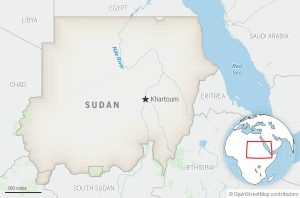BEIRUT (AP) — Fighting in and around a displaced persons camp in western Sudan killed at least 53 civilians and wounded more than 60 others over a three-day period this week, the U.N. human rights chief said, and the death toll is rising.
United Nations High Commissioner for Human Rights Volker Türk said Thursday that drone and artillery strikes by the paramilitary Rapid Support Forces in the Abu Shouk and Daraja Oula neighborhoods of el-Fasher and the el-Fasher displaced persons camp killed 46 people.
Among the 46 killed, over a dozen died in shelling at one of the last functioning hospitals in el-Fasher. The shelling also struck a nearby mosque where people were taking refuge, said the U.N. Human Rights office.
The statement also said at least seven other people were summarily executed after ground raids by the RSF in ethnically motivated killings. Both the RSF and the Sudanese military have been accused of alleged war crimes and crimes against humanity and are under investigation by the International Criminal Court.
“Despite repeated calls, including my own, for specific care to be taken to protect civilians, they continue instead to kill, injure, and displace civilians, and to attack civilian objects, including IDP shelters, hospitals and mosques, with total disregard for international law, ” said Turk. “This must end.”
Türk called for U.N. Member States with direct influence to take urgent measures to “protect civilians and to prevent further atrocities” in el-Fasher and across the Darfur region.
Sudan has been in the throes of conflict since 2023, when tensions between the RSF and the Sudanese military erupted. Darfur has been at the epicenter of the fighting.
The war in Sudan has killed more than 40,000 people, forced more than 14 million to flee their homes and famine has been declared in parts of the country, including Darfur.
El-Fasher, the provincial capital of North Darfur province, has been under siege for over a year. The U.N. and other aid groups warn that 260,000 civilians remain trapped in the city.
Hundreds of thousands have fled to Tawila, just outside el-Fasher.
“I consider Tawila as one of the epicenters of, frankly, what is clearly a humanitarian catastrophe here,” said Denise Brown, the U.N. humanitarian coordinator in Sudan last week from Tawila, the closest they could get to the besieged city of el-Fasher.
“There are about 600,000 internally displaced here, mostly fleeing from el-Fasher,” she said.
They are part of the 10 million people displaced in the country and Brown said the U.N. humanitarian plan is only 25% funded.
She said she met a woman who had just arrived from el-Fasher on a donkey after traveling for seven days through remote villages to stay off back roads with her children, including a severely malnourished baby.
“Local actors on the ground in el-Fasher are doing what they can to provide some very limited basic assistance,” Brown said. “It’s totally insufficient.”
She said the U.N. is working to negotiate access to el-Fasher.
___
Associated Press writer Edith M. Lederer at the United Nations contributed to this report.
By FAY ABUELGASIM
Associated Press

